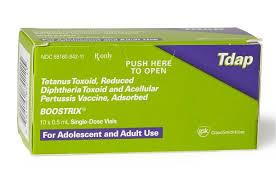Tdap vaccine for adolescents and adults (especially pregnant women)

- posted: May 23, 2018
The Tdap vaccine, normally given to preteens, teens and adults, is different from the DTaP vaccine that we use in infancy and young childhood. It protects against the same diseases (tetanus, diphtheria and pertussis), but the relative amount of each component is different. We get asked about this a lot because it is given routinely to pregnant women during their third trimester and many times the rationale is not fully explained.
Some basics: The vaccine protects against tetanus, diphtheria and pertussis.
- Tetanus - is a bacterial infection commonly acquired through a contaminated wound. The bacteria often lives in dirt and in humans can produce a toxin that can cause severe muscle contractions. The old term for tetanus was "lockjaw," named for the severe clenching of the mouth that some patients developed. Most people have never seen a person with tetanus, partially because the vaccine is so effective. It advised to get a routine tetanus vaccine every 10 years, or after 5+ years if you get a dirty wound.
- Diphtheria - is a bacterial infection that causes respiratory symptoms including cough and fever. It can be severe, especially in the very young and old. We see very little diphtheria in the U.S. today, but some countries that cut back on immunizing against it have seen a resurgence.
- Pertussis - is also known as "whooping cough," named after the sound that some people make when they have this infection. Pertussis in most people causes a pronged coughing illness which can be quite contagious to their close contacts. Some people with pertussis also develop fever, wheezing, and pneumonia. Often it is not diagnosed because a doctor or nurse does not think of testing for it, as other causes of cough are more common. Diagnosis requires a special test which takes a long time to get results. It is treated with an antibiotic. The biggest problem with pertussis is that it can be fatal for the elderly and for newborns.
Tdap vaccine is normally given only once to most people. Preteens get it somewhere between 10 and 12 years old. After that most people continue to get a "Td" vaccine, also just called a tetanus shot, every 10 years. However, about 5 years ago, some obstetricians began giving Tdap vaccine to pregnant women. The rationale for this was that the pertussis antibodies would pass through the placenta to the fetus and the baby would be born with some immunity (called passive immunity) from the mother's vaccination. Normally a baby is not given their first pertussis vaccine until 2 months old, so immunizing mothers during pregnancy gives the baby some protection until then. This elegant strategy works very well, so now it is standard to immunize all pregnant women with Tdap with each pregnancy. For those who never received a Tdap, having a newborn is a great excuse to push grandparents, aunts, uncles and fathers to get the shot they should have anyway, as well as anyone else who will have frequent contact with the newborn. This would also apply to daycare workers, nannies, etc.
In the near future, we are likely to have an improved version of Tdap, and when we do it may replace Td for all adult doses. Stay tuned!!
Here's a story from NPR regarding Tdap vaccine during pregnancy.
USUAL PEDIATRIC SCHEDULE:
- One dose only, at age 11-12 years
- Pregnant women get a dose with EACH pregnancy, in 3rd trimester
Our Location
Hours of Operation
9:00 am - 5:00 pm
9:00 am - 5:00 pm
9:00 am - 5:00 pm
9:00 am - 5:00 pm
9:00 am - 5:00 pm
Closed
Closed